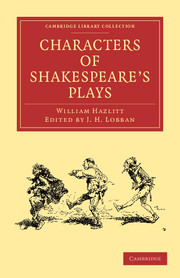Book contents
- Frontmatter
- Preface
- Contents
- Introduction
- Preface
- Cymbeline
- Macbeth
- Julius Cæsar
- Othello
- Timon of Athens
- Coriolanus
- Troilus and Cressida
- Antony and Cleopatra
- Hamlet
- The Tempest
- The Midsummer Night's Dream
- Romeo and Juliet
- Lear
- Richard II
- Henry IV
- Henry V
- Henry VI
- Richard III
- Henry VIII
- King John
- Twelfth Night; or, what you will
- The Two Gentlemen of Verona
- The Merchant of Venice
- The Winter's Tale
- All's Well That Ends Well
- Love's Labour's Lost
- Much Ado About Nothing
- As You Like It
- The Taming of the Shrew
- Measure for Measure
- The Merry Wives of Windsor
- The Comedy of Errors
- Doubtful plays of Shakespear
- Poems and Sonnets
- Notes
Julius Cæsar
Published online by Cambridge University Press: 07 September 2010
- Frontmatter
- Preface
- Contents
- Introduction
- Preface
- Cymbeline
- Macbeth
- Julius Cæsar
- Othello
- Timon of Athens
- Coriolanus
- Troilus and Cressida
- Antony and Cleopatra
- Hamlet
- The Tempest
- The Midsummer Night's Dream
- Romeo and Juliet
- Lear
- Richard II
- Henry IV
- Henry V
- Henry VI
- Richard III
- Henry VIII
- King John
- Twelfth Night; or, what you will
- The Two Gentlemen of Verona
- The Merchant of Venice
- The Winter's Tale
- All's Well That Ends Well
- Love's Labour's Lost
- Much Ado About Nothing
- As You Like It
- The Taming of the Shrew
- Measure for Measure
- The Merry Wives of Windsor
- The Comedy of Errors
- Doubtful plays of Shakespear
- Poems and Sonnets
- Notes
Summary
Julius Cæsar was one of three principal plays by different authors, pitched upon by the celebrated Earl of Halifax to be brought out in a splendid manner by subscription, in the year 1707. The other two were the King and No King of Fletcher, and Dryden's Maiden Queen. There perhaps might be political reasons for this selection, as far as regards our author. Otherwise, Shakespear's Julius Cæsar is not equal, as a whole, to either of his other plays taken from the Roman history. It is inferior in interest to Coriolanus, and both in interest and power to Antony and Cleopatra. It however abounds in admirable and affecting passages, and is remarkable for the profound knowledge of character, in which Shakespear could scarcely fail. If there is any exception to this remark, it is in the hero of the piece himself. We do not much admire the representation here given of Julius Caesar, nor do we think it answers to the portrait given of him in his Commentaries, He makes several vapouring and rather pedantic speeches, and does nothing. Indeed, he has nothing to do. So far, the fault of the character is the fault of the plot.
The spirit with which the poet has entered at once into the manners of the common people, and the jealousies and heart-burnings of the different factions, is shewn in the first scene, where Flavius and Marullus, tribunes of the people, and some citizens of Rome, appear upon the stage.
- Type
- Chapter
- Information
- Characters of Shakespeare's Plays , pp. 33 - 39Publisher: Cambridge University PressPrint publication year: 2009First published in: 1908



